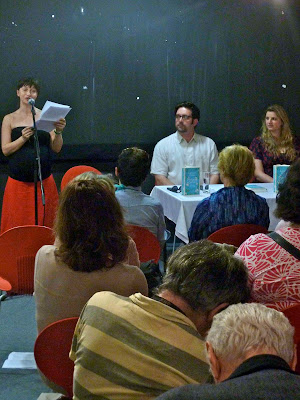Two weeks ago, The Book of Summers came out in Hungary. Happy timing, as the Budapest International Literature Festival was taking place at the same time, and I was invited over as the English representative in the European First Novel Festival. I'll be writing a whole separate entry on that experience, but for now I just want to tell you about Nyarak Könyve, and how beautifully my Hungarian publisher, Park, launched it in Budapest.
After being met at the airport by the lovely Éva, we sped into the city by taxi, windows down, sun beaming, talking over the schedule for my stay. My husband and I arrived at our hotel in the late afternoon, and were greeted by this...
If you've read The Book of Summers, and have a particularly keen eye for cake, you might recognise it as a Dobos Torte; a favourite Magyar cake possessed of a topping that in the book I describe as a 'toffee coloured skating rink'. Or, as the non-English cake baker suggests, 'scating risk', which sounds infinitely more daring. What a lovely sight, especially as it was presented with a copy of my book in Hungarian and a welcome note from my editor, Vera. We made coffee, cut huge slices, and sat on our balcony, basking in the Budapest sunshine.
Fabulous Team Park: Vera and Éva and I
Sunday 21st was the launch event for Nyarak Könyve. It took place at the main site of Budapest's book festival, and it was great to see just how many people came along - maybe they were curious to see how this semi-outsider had written about Hungary. The format for the event was fab: I was interviewed by eminent cultural commentator and TV journalist Balázs Lévai (with the help of a very lovely interpreter, who relayed our conversation to the audience), while renowned Hungarian actress Annamaria Láng read sections from the book. Actually read feels like an understatement, she performed them, with such subtlety and grace that even though I couldn't understand a word (perhaps especially because) I was utterly moved. Afterwards I signed books, regrouped with my family (my mum and dad had also joined us in Budapest - joy!), and went for beers in the sunshine.
Hanging out at the Fisherman's Bastion, post-launch, a fave Budapest spot
There wasn't a lot of time for sightseeing this time in Budapest, but I did make one pilgrimage. A particularly self-indulgent one, too. I was tipped off that at a downtown bookstore there was a rather fabulous window display. On our last morning we hopped on the metro and got off at Rákoczi Street, home to the brilliantly named Libri Könyvpalota (Libri Book Palace). I spotted this from afar...
... move closer...
... and closer still...
It's far easier being unselfconscious when you're abroad, but I didn't even try to pretend to take it in my stride. Pointed. Stared. Posed. If a passer-by finds it one hundredth as head-turning as me it'll have done its job supremely.
It was always going to be a special trip, seeing my words in Hungarian for the first time, and taking part in the Festival with my family there too, but the experience surpassed all expectations. Much of that was down to the kindness and enthusiasm of Park, who looked after me (and my book) so well - Nyarak Könyve couldn't be in better hands. As well as the excitements of the launch, my time in Budapest was made of so many memorable moments. April snows turning to blistering sunshine just before our arrival. White light falling over the Danube at dusk. A driving tour with Éva and András, Park's MD, along the tree-lined serenity of Andrássy Útca, past skateboarders turning tricks at Heroes' Square, and into the green suburbs, for dinner in a garden restaurant. A saturday morning stroll on Margit Island, just steps away from our hotel, a place thronged with pleasure-seekers, tots on trikes and body-beautiful Magyars. Feeling that deep city heat that I love so much - river glittering, pavement cafes bursting at their seams - knowing that summer's on its way. That maybe, in Hungary and with Nyarak Könyve, it has, in fact, already arrived. A huge Köszönöm szépen to all at Park.










